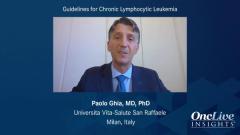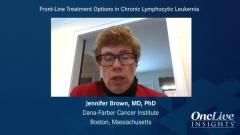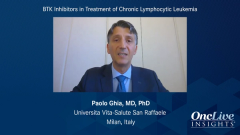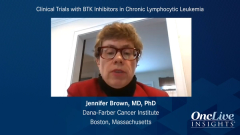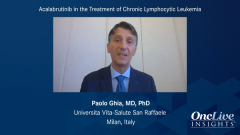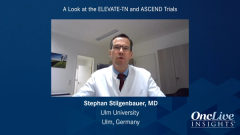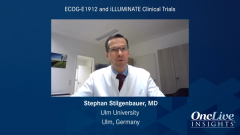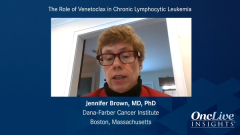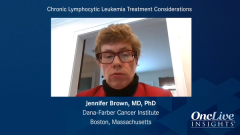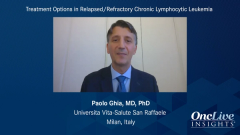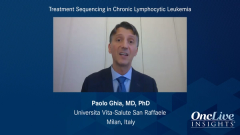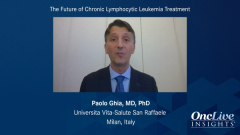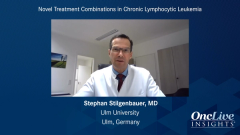
Novel Treatment Combinations in Chronic Lymphocytic Leukemia
Dr Brown and Dr Stilgenbauer provide their input on novel treatment options emerging for chronic lymphocytic leukemia.
Episodes in this series

Jennifer Brown, MD, PhD: In the frontline setting, we are all excited about combining BTK [Bruton tyrosine kinase] inhibitors with BCL2 inhibitors. We have a number of trials now looking at that. I am leading a trial that is comparing acalabrutinib, venetoclax to acalabrutinib, venetoclax, obinutuzumab to chemoimmunotherapy. That will be interesting. It is a 14-month time-limited therapy in each of the novel agent arms vs chemoimmunotherapy. It is all time-limited therapy and includes a fit patient population. Ultimately, we are likely going to need to compare these dual-targeted agent options to single-targeted agent options and to venetoclax, obinutuzumab. There is a trial ongoing to do that: the CLL17 trial from the German CLL [Chronic Lymphocytic Leukemia] Study Group.
We eagerly await that data, as well as sequencing data. We are going to need to understand the mechanisms of relapse better. Can we use both BTK and BCL2 in the front line and reuse them later? That is obviously important. We do not want to use up all our therapeutic options if it turns out that we cannot repeat them later the way we think we probably can. If you treat for a year and patients are in remission for 8 years, we can hopefully re-treat.
The other category of drug that is coming into the clinic and was presented at ASH [the American Society of Hematology annual meeting] 2020 is the noncovalent BTK inhibitors that would hopefully reduce the development of resistance because they work equally well against the C481S mutation as wild-type BTK. The LOXO-305 molecule is a potent and specific BTK inhibitor, which over 150 patients with CLL have been treated with, and response rates are high, including many patients who progressed on ibrutinib. This may be a class of drugs that allows us to extend our benefit of BTK inhibition even past the time of resistance, and if active enough, it may be able to move earlier in therapy. I would encourage people to keep their eyes out for this class as we move forward.
Stephan Stilgenbauer, MD: With regard to the future outlook of CLL treatments, we have interesting new developments on the horizon. Of those still experimental approaches that are available only in clinical trials, we today have the combination of all the good novel things that we have available. Most interesting are the triple combination trials that are underway: the trials that combine the BCL2 inhibitor venetoclax with a BTK inhibitor, such as acalabrutinib or ibrutinib, and possibly even a third combination partner, namely an antibody, and the preferred one is obinutuzumab.
We have early data available with these triple combinations that they can lead to deep and durable responses, and are still well tolerated. These triple combinations look favorable in early clinical data. We also have data available for a doublet combination of a BCL2 inhibitor and BTK inhibitor, and these also look good, and they possibly avoid the additional toxicity of adding in an antibody.
All these combinations of BTK plus BCL2 inhibitor, possibly adding in an antibody, are under investigation in phase 3 head-to-head comparisons, comparing to standard single-agent BTK or BCL2 inhibitor. Therefore, in the future, we will have firm data available on whether combining all the new agents into a single regimen or using them sequentially will be the better approach for our patients.
Additional developments are on the horizon: novel antibodies, bispecific antibodies, and in particular the CAR [chimeric antigen receptor] T cells targeting CLL and other lymphomas from an immunological site are underway.
Given the dramatic progress that we had with easy to give pills, oral treatments, in the management of CLL, obviously CLL is not the prime scenario in which we would use a treatment that is sophisticated, expensive, and prone to treatment-emergent [adverse] effects such as CAR T cells. But among the patients who failed the novel options that we have available such as BTK inhibitors or BCL2 inhibitors, and in particular both of these treatment regimens, CAR T-cell therapy in the future may hold great promise. Overall, we are living in exciting times. We have novel agents on the horizon. We have combinations of the established treatment principles in clinical trials underway, so these are good times for our patients with CLL because we have great developments, and the future is looking bright.
Transcript edited for clarity.


